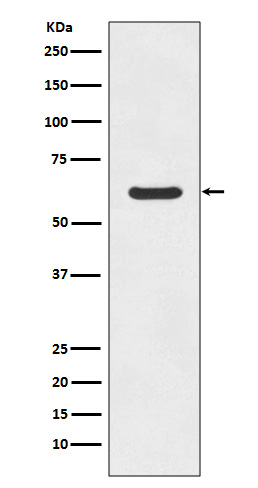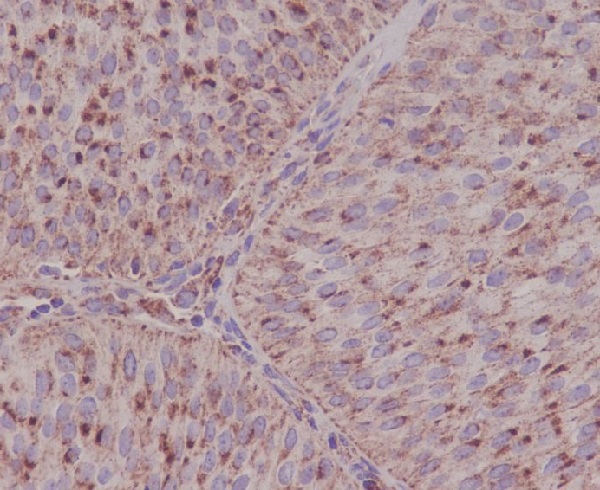

| WB | 1/500-1/1000 | Human,Mouse,Rat |
| IF | 咨询技术 | Human,Mouse,Rat |
| IHC | 1/50-1/100 | Human,Mouse,Rat |
| ICC | 1/50-1/200 | Human,Mouse,Rat |
| FCM | 咨询技术 | Human,Mouse,Rat |
| Elisa | 咨询技术 | Human,Mouse,Rat |
| Aliases | TS11; ASNSD; ASNS; Asparagine synthetase [glutamine-hydrolyzing] |
| Entrez GeneID | 440 |
| WB Predicted band size | Calculated MW: 64 kDa; Observed MW: 61 kDa |
| Host/Isotype | Rabbit IgG |
| Antibody Type | Primary antibody |
| Storage | Store at 4°C short term. Aliquot and store at -20°C long term. Avoid freeze/thaw cycles. |
| Species Reactivity | Human,Mouse,Rat |
| Immunogen | A synthesized peptide derived from human ASNS |
| Formulation | Purified antibody in PBS with 0.05% sodium azide. |
+ +
以下是3篇关于天冬酰胺合成酶(Asparagine Synthetase, ASNS)抗体的文献摘要概览:
---
1. **文献名称**:*Asparagine synthetase expression and phase I study with L-asparaginase in children with acute lymphoblastic leukemia*
**作者**:Lorenzi PL et al. (2006)
**摘要**:研究通过ASNS抗体检测白血病细胞中ASNS蛋白水平,发现高表达ASNS的患儿对L-天冬酰胺酶治疗响应较差,提示ASNS可作为耐药性生物标志物。
---
2. **文献名称**:*Expression of asparagine synthetase in human hepatocellular carcinoma*
**作者**:Zhang B et al. (2013)
**摘要**:利用ASNS特异性抗体进行免疫组化分析,发现肝癌组织中ASNS表达显著升高,与肿瘤进展和不良预后相关,可能成为肝癌治疗的潜在靶点。
---
3. **文献名称**:*Asparagine synthetase deficiency alters cellular responses to glutamine starvation*
**作者**:Dufour E et al. (2012)
**摘要**:通过Western blot和免疫荧光(使用ASNS抗体)研究结肠癌细胞,发现ASNS缺失导致谷氨酰胺代谢重编程,影响癌细胞在营养应激下的存活机制。
---
**备注**:若需获取全文或更多文献,建议通过PubMed或Web of Science检索关键词“Asparagine Synthetase antibody”或“ASNS immunohistochemistry”。部分研究可能侧重抗体应用方法,需结合实验目的筛选。
Asparagine synthetase (ASNS) is an ATP-dependent amidotransferase enzyme that catalyzes the synthesis of asparagine from aspartate and glutamine, playing a critical role in cellular amino acid metabolism and homeostasis. ASNS antibodies are immunological tools designed to detect and quantify the expression of this enzyme in biological samples. These antibodies are widely used in research to study ASNS regulation, particularly under conditions of nutrient stress, such as amino acid deprivation or endoplasmic reticulum (ER) stress. ASNS expression is tightly regulated by the integrated stress response (ISR) pathway, and its upregulation is associated with cancer cell survival, drug resistance, and adaptation to metabolic challenges.
ASNS antibodies are employed in techniques like Western blotting, immunohistochemistry (IHC), and immunofluorescence (IF) to assess protein levels, localization, and tissue-specific expression patterns. Commercially available ASNS antibodies are typically monoclonal or polyclonal, with specificity validated across human, mouse, and rat models. Research has highlighted ASNS as a potential therapeutic target, especially in cancers like acute lymphoblastic leukemia (ALL), where asparagine depletion strategies (e.g., L-asparaginase therapy) are clinically relevant. Additionally, mutations in the ASNS gene are linked to asparagine synthetase deficiency, a rare neurological disorder, making these antibodies valuable for diagnostic and mechanistic studies.
Ongoing studies focus on understanding ASNS's role in tumor metabolism, neuronal development, and response to chemotherapy, underscoring its broader implications in both disease mechanisms and treatment strategies.
×